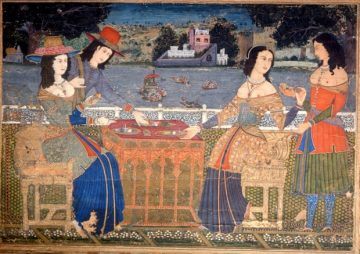Maya Jasnoff in The Guardian:
 It’s a well-known saying that women lost us the empire,” the film director David Lean said in 1985. “It’s true.” He’d just released his acclaimed adaptation of A Passage to India, EM Forster’s novel in which a British woman’s accusation of sexual assault compromises a friendship between British and Indian men. Misogyny may not be the first prejudice associated with British imperialists, but it has proved as enduring as it was powerful. As Katie Hickman discovered when she started writing about British women in India, Lean’s view (if not Forster’s) “remains stubbornly embedded in our consciousness”. “Everyone” she talked to “knew that if it were not for the snobbery and racial prejudice of the memsahibs there would, somehow, have been far greater harmony and accord between the races”. Her book, vivaciously written and richly descriptive, offers a rebuke to such stereotypes. She animates a cast of British women who travelled to India before the 1857 rebellion. They included “bakers, dressmakers, actresses, portrait painters, maids, shopkeepers, governesses, teachers, boarding house proprietors … missionaries, doctors, geologists, plant-collectors, writers … even traders” – and some of them might not have been out of place in a Lean epic of their own.
It’s a well-known saying that women lost us the empire,” the film director David Lean said in 1985. “It’s true.” He’d just released his acclaimed adaptation of A Passage to India, EM Forster’s novel in which a British woman’s accusation of sexual assault compromises a friendship between British and Indian men. Misogyny may not be the first prejudice associated with British imperialists, but it has proved as enduring as it was powerful. As Katie Hickman discovered when she started writing about British women in India, Lean’s view (if not Forster’s) “remains stubbornly embedded in our consciousness”. “Everyone” she talked to “knew that if it were not for the snobbery and racial prejudice of the memsahibs there would, somehow, have been far greater harmony and accord between the races”. Her book, vivaciously written and richly descriptive, offers a rebuke to such stereotypes. She animates a cast of British women who travelled to India before the 1857 rebellion. They included “bakers, dressmakers, actresses, portrait painters, maids, shopkeepers, governesses, teachers, boarding house proprietors … missionaries, doctors, geologists, plant-collectors, writers … even traders” – and some of them might not have been out of place in a Lean epic of their own.
…A clue as to how strange the Englishwomen may have appeared in turn comes from the 1838 diary of Fanny Eden (sister of the governor-general Lord Auckland), who on concluding a visit to one zenana was startled when her hostesses “took a fit of fun and instead of quietly pouring attar of roses over our hands” – as was conventional – “took to smearing our gowns all over with it, laughing vehemently at the utter ruin they were perpetrating”.
More here.
